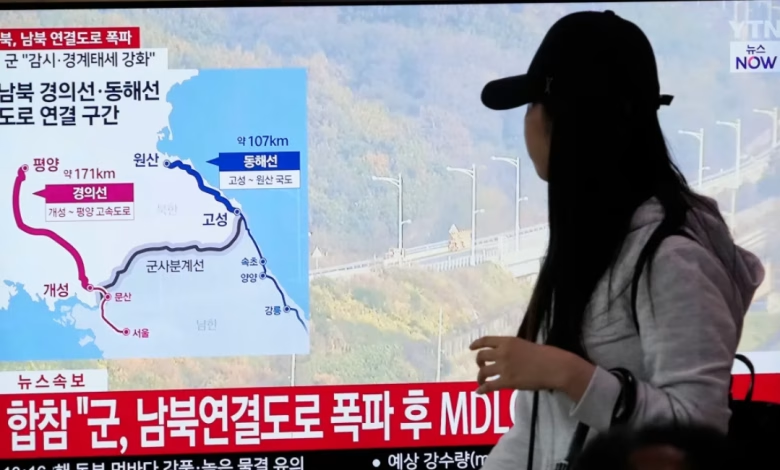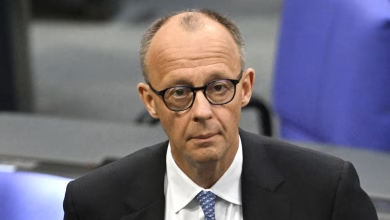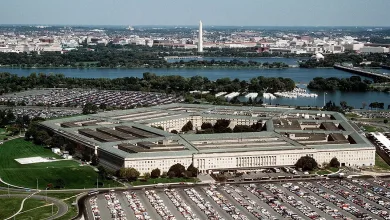North Korea Destroys Roads Near Border with South After Warning to Sever All Ties

On Tuesday, North Korea blew up parts of two major roads connecting to the southern peninsula, according to South Korean authorities. This action follows Pyongyang’s warning that it would take steps to sever all ties with the South.
Explosives were used to destroy sections of the Gyeongui line on the West coast and the Donghae line on the East coast around 12 p.m. local time, as reported by Seoul’s Joint Chiefs of Staff (JCS).
While the destruction of these travel routes has minimal practical impact—since the roads have not been in use for years and the Koreas are separated by one of the world’s most heavily fortified borders—the move carries significant symbolic weight amid escalating tensions between the two leaders.
Video footage released by the South Korean Defense Ministry showed several explosions occurring on the northern side of the military demarcation line. Heavy machinery, including trucks and excavators, was later seen working at one of the roads, which had been partially obstructed by a black barrier. The JCS noted that the North was engaged in “additional works with heavy machinery” at the site but did not provide further details.
In response to the explosions, the South Korean military fired warning shots in the area south of the military demarcation line and is closely monitoring North Korean military activities, maintaining a “fully ready posture” in coordination with the U.S., according to the JCS.
On Monday, South Korea reported detecting signs that North Korea was preparing to demolish roads connecting the two countries, warning that explosions could happen imminently. The Defense Ministry stated that its military had implemented countermeasures but did not disclose specific details.
A spokesman for the Joint Chiefs of Staff (JCS), Lee Sung-joon, stated that the South Korean military observed individuals working behind barriers on the North’s side of the border.
The explosions occurred shortly after North Korea accused South Korea of flying propaganda-filled drones over its capital, Pyongyang, and threatened “retaliation.” This exchange follows months of tensions marked by North Korea sending balloons filled with trash to the South.
Last week, North Korea’s military announced plans to take the “substantial military step” of completely isolating its territory from South Korea, following leader Kim Jong Un’s decision to abandon a long-standing policy of pursuing peaceful reunification earlier this year.
Since the Korean War ended in 1953 with an armistice agreement, North and South Korea have remained divided. While both governments have historically sought reunification, Kim declared in January that North Korea would no longer pursue reconciliation, labeling inter-Korean relations as “a relationship between two hostile countries and two belligerents at war,” according to KCNA
In a statement released by state-run news agency KCNA on October 9, the general staff of the Korean People’s Army (KPA) announced that all remaining roads and railways connecting to South Korea would be completely severed, effectively blocking access along the border.
“The acute military situation on the Korean peninsula necessitates the armed forces of the DPRK to implement more resolute and stronger measures to defend national security,” the statement read, referring to North Korea by its official name, the Democratic People’s Republic of Korea.
The KPA cited recent “war exercises” conducted in South Korea and alleged visits by U.S. strategic nuclear assets in the region as reasons for these measures. Over the past year, various U.S. military assets, including an aircraft carrier, amphibious assault ships, long-range bombers, and submarines, have visited South Korea, provoking strong condemnation from Pyongyang.
Since January, North Korea has bolstered its border defenses by laying landmines, constructing anti-tank traps, and dismantling railway infrastructure, according to the South Korean military.
Tensions have also escalated between the North and South Korean leaders, with Kim Jong Un threatening to use nuclear weapons against South Korea if attacked. This warning followed a statement from South Korea’s president, who cautioned that if the North employed nuclear weapons, it would “face the end of its regime.”
These developments come as North Korea appears to be ramping up its nuclear production efforts and strengthening ties with Russia, raising widespread concerns in the West about the regime’s trajectory.
Leif-Eric Easley, a professor at Ewha Womans University in Seoul, suggested that North Korea’s decision to isolate itself from the South could be a strategy for Kim to “shift blame for its economic failures and legitimize its costly missile and nuclear weapons buildup” by amplifying perceived external threats.
“Kim Jong Un wants both domestic and international audiences to perceive him as acting from a position of military strength, but he may actually be motivated by political weakness,” Easley noted. “North Korea’s threats, whether real or rhetorical, reflect the survival strategy of a hereditary dictatorship.”






